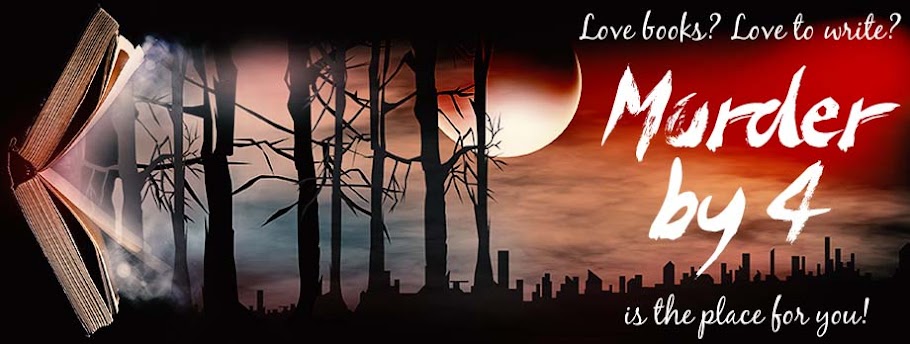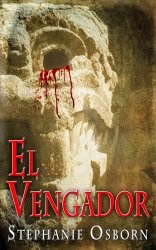
Hello, MB4 fans and friends!
For Halloween, I thought I'd dig into the bowels of my articles to find something suitably spooktacular. ;o) (Can you say "reprint?" LOL.)
I thought I'd dust this piece off and share it with you today. Let me know if it gives you a chuckle or a thrill.
Who's That Knocking?
 Living
in an antique home has its problems, especially when you're not a
handyman. My father taught me all sorts of wonderful things when he was
alive, including an unbridled passion for the arts, gardening, nature,
gourmet cooking, and the love of a good mystery. He didn't know much
about mechanics, plumbing, electric, or woodworking. Though I've tried
to learn over the years with self-help books and advice from friends, I
remain singularly unhandy, perpetually bowing with an unholy need to the
whims of the local plumber and electrician.
Living
in an antique home has its problems, especially when you're not a
handyman. My father taught me all sorts of wonderful things when he was
alive, including an unbridled passion for the arts, gardening, nature,
gourmet cooking, and the love of a good mystery. He didn't know much
about mechanics, plumbing, electric, or woodworking. Though I've tried
to learn over the years with self-help books and advice from friends, I
remain singularly unhandy, perpetually bowing with an unholy need to the
whims of the local plumber and electrician. Take, for example, the twenty-six windows that are crumbling as we speak. The six-by-nine inch panes are coming loose from their wooden mullions with alarming frequency. Or the floorboards in the bedroom, a lovely old yellow pine, that poke up like teepees when it's hot and muggy. Yeah, they need to be treated with some kind of poly something-or-other, but for now, the moisture makes them swell. Consider the two wells that sometimes work in concert - except for the hundred times a year I have to run down to the cobwebbed cellar and reset the breakers or tap on the pump to make it work. The disadvantages are many.
But there are also great benefits, such as the three working fireplaces. Or the soil that surrounds the property, rich and black, untouched by bulldozers. It's not like the hard packed fill they put in the new housing tracts. I don't need to "amend" this soil. I just need to keep up with the produce and flowers.
Most intriguing of all, however, is the rich history.
Our house was built in 1811 by Dr. David Hunt. We just celebrated our 200th anniversary!
Okay, so compared to the homes in Europe, it's just an infant. But in terms of our country and its young age, it's amazing. Think about it. This house was built and lived in more than fifty years before the civil war!
Imagine the births, deaths, dramas, romances, and heartaches that occurred within these rooms. Did the inhabitants suffer from small pox? Starvation? Were they affluent? How many horses or cows did they own? And... how many ghosts linger in these plaster and lathe walls?
Let's examine the past 100 years. According to an elderly neighbor, over seven people have died on Hunts Corners. Traffic accidents. Maybe even horse and buggy accidents. Auto drivers not stopping for the all-way stop signs, or sliding on ice, or drunk drivers plowing right into the telephone pole. Sad to think about. Makes you wonder about their spirits. Did they ascend to Heaven? Or do a few guilty souls remain in the area, confused and wandering, seeking the path to redemption?
Recently, I began to ponder another death disclosed to me by a young neighbor friend. We began to correspond after he read a few of my books. He's a bright and entertaining young fellow who happens to be a voracious reader. We clicked. And we chat back and forth about books and life and sometimes... about the history of our area.
 It
seems Hunts Corners has a mystery all its own, stemming from the early
1900s. As the story goes, my young neighbor's great grandmother noticed
something odd one day. While going about her daily duties, Mabel
realized she hadn't seen the young girl who lived next door in a long
time. Anna no longer attended school, and very rarely made an appearance
outside the home. When she did, Mabel noticed a thickening in her
middle, well-wrapped by heavy garments. She suspected the girl was with
child. In that era, a pregnancy out of wedlock was unthinkable.
Shameful. A sin. The family would endure public humiliation if news got
out. So Anna was sequestered for nine long months as Mabel watched the
child grow in her belly.
It
seems Hunts Corners has a mystery all its own, stemming from the early
1900s. As the story goes, my young neighbor's great grandmother noticed
something odd one day. While going about her daily duties, Mabel
realized she hadn't seen the young girl who lived next door in a long
time. Anna no longer attended school, and very rarely made an appearance
outside the home. When she did, Mabel noticed a thickening in her
middle, well-wrapped by heavy garments. She suspected the girl was with
child. In that era, a pregnancy out of wedlock was unthinkable.
Shameful. A sin. The family would endure public humiliation if news got
out. So Anna was sequestered for nine long months as Mabel watched the
child grow in her belly. When the time came for the baby to be born, there was no activity in the house. No child was seen. No doctor arrived. All was quiet.
Speculation grew. Was the child stillborn? Or worse, was she murdered by a family cloaked in shame? Rumors were that the little baby was buried behind Anna's house.
Since then, there have been reports of children pointing behind the house, exclaiming about the "little girl in the weeds." The adults couldn't see her.
But I think I might have, last winter.
I rose early to photograph our Christmas lights. They were unusually festive last year, better than all past years. We'd added a few lighted deer for fun, and I was bound and determined to capture the beauty in the blackest of night. It was a clear, chill morning. Five A.M. Not a breeze stirred. Most households were fast asleep. Few cars passed by.
I brought my trusty Canon Powershot outdoors and took dozens of photos. Later, when I viewed them on my PC, I saw the ghost. There she was - looking straight at me with wide open eyes. Filmy, transparent, but with a clear face and body. Only two shots revealed her, although I took dozens that morning.
The photos are untouched, straight from the camera card. And yes, I know there's probably a scientific explanation. Maybe the light from the flash illuminated ice crystals in the air, causing a momentary illusion. But I'd like to ignore that for now and just consider it a visit from my friendly little ghost.
Last night I woke to a tapping sound. Usually it's Max, on his chair, scratching an itch and thumping up against the armrest. I rose to check, but he lay still, mouth open, breathing evenly.
Could it be my grandson knocking on the door? I looked. No one was there. All was quiet, no little boys or cats were hoping to gain entrance.
I went back to bed. The tapping resumed. Looking out the window, I noticed headlights flashing by, briefly illuminating the darkness. Was that a flash of white? A face? Or simply the reflection on wet streets?
The tapping resumed. Outside my window. On the second floor.
Was our little ghost back?
I probably should have waved to her. But I pulled down the shade and buried myself beneath the comforter. ;o)
Aaron Lazar
www.lazarbooks.com








.jpg)


